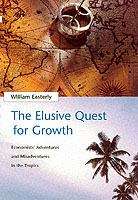The Elusive Quest for Growth: Economists' Adventures and Misadventures in the Tropics
By:
Sign Up Now!
Already a Member? Log In
You must be logged into Bookshare to access this title.
Learn about membership options,
or view our freely available titles.
- Synopsis
- Since the end of World War II, economists have tried to figure out how poor countries in the tropics could attain standards of living approaching those of countries in Europe and North America. Attempted remedies have included providing foreign aid, investing in machines, fostering education, controlling population growth, and making aid loans as well as forgiving those loans on condition of reforms. None of these solutions has delivered as promised. The problem is not the failure of economics, William Easterly argues, but the failure to apply economic principles to practical policy work. In this book Easterly shows how these solutions all violate the basic principle of economics, that people--private individuals and businesses, government officials, even aid donors--respond to incentives. Easterly first discusses the importance of growth. He then analyzes the development solutions that have failed. Finally, he suggests alternative approaches to the problem. Written in an accessible, at times irreverent, style, Easterly's book combines modern growth theory with anecdotes from his fieldwork for the World Bank.
- Copyright:
- 2002
Book Details
- Book Quality:
- Excellent
- Book Size:
- 342 Pages
- ISBN-13:
- 9780262550420
- Publisher:
- MIT Press
- Date of Addition:
- 03/02/10
- Copyrighted By:
- Massachusetts Institute of Technology
- Adult content:
- No
- Language:
- English
- Has Image Descriptions:
- No
- Categories:
- History, Nonfiction, Business and Finance, Social Studies, Politics and Government
- Submitted By:
- Worth Trust
- Proofread By:
- Worth Trust
- Usage Restrictions:
- This is a copyrighted book.
Reviews
5 out of 5
By Aqil Sajjad on Apr 15, 2011
An excellent book. Five stars! It gives an overview of many magic potients that people thought would work but did not work, and then explains what the author believes is the key to unlocking the economic potential of a country. Coming from someone who has worked at the world bank, there is also an interesting discussion of why international financial institutions have had limited success and gives constructive recommendations on how better results could be achieved. If you are from a developing country, you would be able to directly relate with many of the things in the book. The author cites data in favour of all his conclusions, and the language is equally accessible to non-economists. A must-read for anyone interested in development economics.
Other Books
- by William Easterly
- in History
- in Nonfiction
- in Business and Finance
- in Social Studies
- in Politics and Government
